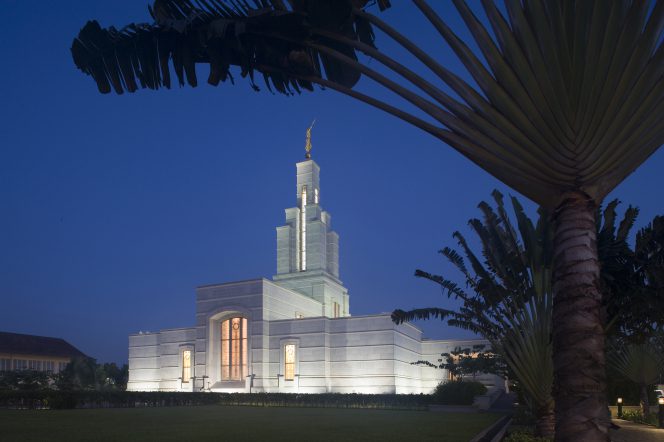
First of all, racial bigotry is hateful, and an offense against the Gospel of Jesus Christ. Just to be clear.
The Salt Lake Tribune has just published two relevant articles on the topic of Mormonism and race:
“39 years later, priesthood ban is history, but racism within Mormon ranks isn’t, black members say”
“Steps the Mormon church could take to enhance race relations within the faith”
And here’s a response to the Tribune from Tarik LaCour, an insightful and well-informed Latter-day Saint thinker who, as it happens, is black:
http://tarikdlacour.blogspot.com/2017/06/response-to-salt-lake-tribune-article.html?spref=fb
It’s well worth a look.
Permit me to offer my own brief (and hasty) responses to the suggestions offered by the Tribune. There will be some formatting issues, but I don’t have time at the moment to deal with them:
Cast a black Adam and Eve (or an interracial couple) in the film shown to faithful members in LDS temples.
I have no strong objection to either of these, except that I think using an interracial couple might raise distracting and needless theological questions in the minds of some temple patrons.
Use more African-American faces in church art and manuals and display more artwork depicting Christ as he would appear: as a Middle Eastern Jewish man.
Show the documentary film “Nobody Knows: The Untold Story of Black Mormons” to every all-male priesthood quorum, women’s Relief Society class and Young Men and Young Women groups.
Again, no real objection.
Quote from the church’s Gospel Topics essay “Race and the Priesthood” regularly at LDS General Conference and translate it into all the languages that the church uses to communicate with its global membership.
I’m all for translating it, and I would be happy to have it quoted. Even multiple times. But “regularly”? That begins to smack of indoctrination to me.
Direct that the essay be read from the pulpit in every Mormon congregation and mission in the world.
Again, it seems a bit like indoctrination.
Have the Book of Mormon scripture found in 2 Nephi 26:33 — “All are alike unto God” — be a yearlong Young Women or Primary theme and make it part of the curriculum to talk about the sin of racism.
2 Nephi 26:33 would be a good theme. I’m not sure that I like the idea of making the sin of racism a part of the curriculum, though. I think it can be adequately handled as a part of lessons on kindness, charity, the universal fatherhood of God, respect for all humankind (including women, too) as children of God, and so forth.
Bring more blacks to LDS Church-owned Brigham Young University as students and faculty, while providing sensitivity training for all students about racial issues and interactions with people of color.
I would the delighted to see more black faculty and students at BYU. However, I dislike the very idea of “sensitivity training.” It makes me think of Communist “re-education camps.”
Teach children about the heroic black Mormon lives, such as LDS pioneers Jane Manning James and Elijah Abel.
I’m enthusiastically for this one.
Expand the LDS hymnbook to include more diverse songs and styles.
I’m very much for expanding the LDS musical range. I’m less convinced that this needs to be done in the hymnal. (For one thing, the thought of predominantly white Mormon congregations trying to sing gospel makes me queasy.) I would encourage musical numbers in sacrament meetings from outside the hymnal.
Enlist more people of color in the Mormon Tabernacle Choir.
Certainly, if they’re available.
Invite the choir from the Genesis Group — a longtime Utah-based support organization for black Mormons and their families — to sing at General Conference.
Fine with me. Might be fun. (Are they good?)
Use the Genesis Group to assist in improving relationships with the African-American community.
Sure.
Give the Genesis Group greater authority to exist in all states and to visit wards and assist lay bishoprics in how to avoid and overcome racism in their congregations.
Perhaps. Something to think about. But there would be other groups — including apologetic organizations — that would like to have authority to go around and talk locally. This could set a dangerous precedent.
Create a church-sponsored Mormon and black website akin to the one found at mormonandgay.org.
Seems a good idea.
Treat the members of the Genesis Group’s presidency as an auxiliary, seating them on the stand with other high-ranking authorities during General Conference — and invite at least one of them to speak during the sessions.
Unless and until their role is expanded as proposed above, I don’t think that the Genesis Group would really be a general Church auxiliary organization in the same sense that, say, the Relief Society and the Sunday School are.
Provide training on racial issues for newly called mission presidents.
Hmmmm. Maybe. But, again, I dislike anything remotely like “sensitivity training.”
Include a mandatory class at Missionary Training Centers that teach the “Race and the Priesthood” essay so missionaries are better prepared when they go out to preach.
I would like to see all of the Gospel Topics Essays taught at the Missionary Training Centers — and elsewhere throughout the Church
Gotta go.
Posted from Richmond, Virginia











